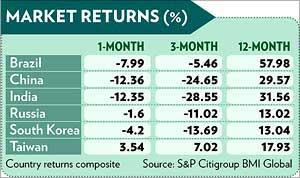The stockmarket is now down over 20 per cent from the top. The bad news is aggregating by the day. Foreign institutional investors have sold equity worth over Rs 11,000 crore in the Indian market since then.
Inflation has been climbing up week after week and stands at 7.33 per cent, down marginally from 7.41 per cent in the previous week, as we go to print.
Commodity prices are at their all-time highs. A barrel of crude oil now costs $114. The global economy is expected to slow down, and the on-steroids Indian economy is to moderate. These facts are hard to digest.
All the more so if you are an equity investor who has witnessed the unprecedented bull run of the last four years. When, between May 2004 and January 2008, you have became used to seeing your equity investments grow by a compounded annual rate of about 40 per cent-plus it is hard to come to terms with a 10-15 per cent growth.
Even after this 20 per cent correction in the markets, the near future does not look very rosy. With no short-term upside visible, should you exit equity markets completely? If you are a long-term investor, as one should be, there is no need to abandon equity as an asset class, even if you are scared after witnessing the effects of the falling market on your portfolio. However, what you do need to do is restructure your portfolio. Look out for stocks that have a high earning visibility. These are bound to be good long-term performers.
If your interest is for the short term, then you should avoid taking any position at this stage. Intra-day volatility is high and as the market is very nervous, there is no telling what will trigger a huge rise or fall on an everyday basis.
For the next few weeks, market sentiment will be governed largely by corporate results. For now, it looks like the earning momentum is still intact and valuations have become attractive.
 A market report released by Angel Broking, a prominent Indian broking firm, on 5 April, says: "For FY07-10 estimated, Sensex companies are expected to log in a compounded annual growth rate of 21.5 per cent. For FY09 and FY10 estimated, the Sensex is expected to post an earnings per share of Rs 976 and Rs 1,193, respectively."
A market report released by Angel Broking, a prominent Indian broking firm, on 5 April, says: "For FY07-10 estimated, Sensex companies are expected to log in a compounded annual growth rate of 21.5 per cent. For FY09 and FY10 estimated, the Sensex is expected to post an earnings per share of Rs 976 and Rs 1,193, respectively."
Investing in large-cap stocks can be a good idea as large-cap companies recover first when markets recover. For example, in the May-June 2006 market fall, the Sensex dropped from 12,600 to 9,800. The BSE Small Cap Index also corrected from 7,800 to 4,800. The Sensex recovered in September 2006 but the Small Cap Index reached its previous level only in July 2007.
There is no reason for you to be worried if you have fundamentally good, well-managed companies in your portfolio. Ignore the daily ups and downs of the market and focus on the long-term earning potential of your stocks. Snap up a good stock that you could not buy earlier because of high valuations if it has shed some weight now, thanks to this correction.





